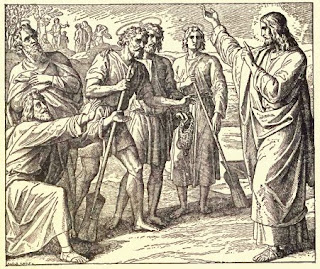FEAST OF ST. ANDREW THE APOSTLE.
NOVEMBER 30.
ANDREW, a brother of St. Peter, born at Bethsaida, was first a disciple of John the Baptist. Afterwards both the brothers were called by Christ, on the Sea of Galilee, before all the other apostles, with the words : “Come after Me, and I will make you to become fishers of men” (Mark i. 17). Immediately they left all, and became faithful disciples of Jesus, arid witnesses of His deeds and sufferings, of His resurrection and ascension. After the descent of the Holy Ghost Andrew travelled through Scythia, Epirus, and Thrace, and by his teachings and miracles converted vast numbers to Christ. As he was preaching at Patras, a city of Achaia, he was violently pressed by the proconsul, Aegeas, to offer sacrifice to the idols; but he nobly answered him, “I daily offer sacrifice to God ; not the flesh of oxen, nor the blood of rams, but an unspotted Lamb ; and although all the faithful may have partaken of His flesh, yet the Lamb remains as before He was offered, alive and undivided.” Aegeas, enraged, committed him to prison, and on the following day caused him to be scourged; and as he persevered in his declaration, condemned him to be put to death by crucifixion. When he saw the cross, the instrument of his death, he greeted it with joy, embraced it, and said, “O good cross, that was adorned with the limbs of Christ, thee have I long desired; thee have I fervently loved; thee have I continually sought. Now thou art made ready for me, according to the wish of my heart. Take me away from men, and restore me again to my Master, that through thee I may come to Him Who through thee has redeemed me.” After this he was nailed to the cross. Two days he remained hanging thereon, preaching faith in Jesus, until his soul was taken up to Him Whom he had so ardently desired to resemble in the manner .of His death.
In the Introit of the Mass the Church announces to us how greatly the apostles were exalted by God, Who made them teachers and fathers of the whole world. She cries out, therefore, “To me Thy friends, O God, are made exceedingly honorable; their principality is exceedingly strengthened. Lord, Thou hast proved me and known me ; Thou hast known my sitting down and my rising up “(Ps. cxxxviii.). Glory be, etc.
Prayer.
We suppliantly beseech Thy majesty, Lord, that as blessed Andrew the apostle was both a preacher and ruler of Thy Church, so he may be with Thee as a perpetual intercessor for us. Through Christ, etc. Amen.
EPISTLE. Rom. x. 10-18.
Brethren: With the heart, we believe unto justice; but, with the mouth, confession is made unto salvation. For the Scripture saith: Whosoever believeth in Him, shall not be confounded. For there is no distinction of the Jew and the Greek : for the same is Lord over all, rich unto all that call upon Him. For whosoever shall call upon the name of the Lord, shall be saved. How then shall they call on Him, in Whom they have not believed? Or how shall they believe Him, of Whom they have not heard? And how shall they hear, without a preacher? And how shall they preach unless they be sent, as it is written : How beautiful are the feet of them that preach the gospel of peace, of them that bring glad tidings of good things ! But all do not obey the gospel. For Isaias saith : Lord, who hath believed our report? Faith then cometh by hearing : and hearing by the word of Christ. But I say : Have they not heard? Yes, verily, their sound hath gone forth into all the earth and their words unto the ends of the whole world.
GOSPEL. Matt. iv. 18-22.
At that time: Jesus walking by the Sea of Galilee, saw two brethren, Simon who is called Peter, and Andrew his brother, casting a net into the sea (for they were fishers). And He saith to them: Come ye after Me, and I will make you to be fishers of men. And they immediately leaving their nets, followed Him. And going on from thence, He saw other two brethren, James the son of Zebedee, and John his brother, in a ship with Zebedee their father, mending their nets: and He called them. And they forthwith left their nets and father, and followed Him.
Explanation.
The alacrity with which Andrew followed the call of Jesus teaches us: 1. That we should, on the spot, give ear to God when He inspires us with a good thought, or calls us to a better course of life. 2. That, in order to follow His voice, we should cast behind us all desires for temporal goods, and even leave our parents, if they should prove a hindrance to us, for “ he that loveth father or mother more than Me is not worthy of Me”
(Matt. x. 37).
Aspiration.
Mayest Thou be forever praised, most amiable Jesus, that Thou didst choose, not the wise, the mighty, or the rich, but, what in the eyes of the world was foolishness, to confound the wisdom and power of the world, and didst accordingly graciously look upon poor fishermen, and exalt them to the height of the apostolic dignity. Look also with fatherly regards upon us, Thy frail children ; call, nay, draw, us in such manner to Thee that, after the example of St. Andrew, we may suffer nothing in the world to detain us from following Thee, and may always glory in Thy cross, which is our salvation, our life, and our resurrection.
----------------------
Next-Feast of St. Francis Xavier, December 3

